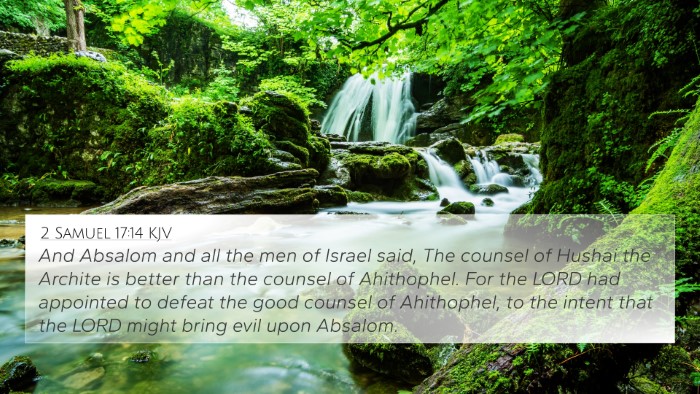Bible Verse Meaning: 2 Samuel 2:12
This passage from 2 Samuel 2:12, which reads, "And Abner the son of Ner, and the servants of Ish-bosheth the son of Saul, went out from Mahanaim to Gibeon," holds significant implications in the narrative of David's ascendance to the throne of Israel. In this commentary, we will explore the meaning and interpretation of this verse using insights from public domain commentaries by Matthew Henry, Albert Barnes, and Adam Clarke.
Context and Background
The events surrounding 2 Samuel 2:12 occur in the turbulent period after Saul's death, highlighting the struggle for power among the tribes of Israel. Abner, a commander of Saul's forces, supports Ish-bosheth, Saul's son, while David, having been anointed king over Judah, is establishing his reign. This division of loyalty sets the stage for conflict and the eventual unification of Israel under David.
Interpretation and Insights
- Matthew Henry's Considerations:
Henry notes the strategic nature of Abner's actions and emphasizes that they signify a rejection of David's kingship. Abner's march represents the continuing loyalty of Saul’s supporters and the fracturing Israelite unity at this time. Henry highlights this as a moment of significant political rivalry that must be resolved for national stability.
- Albert Barnes' Analysis:
Barnes points to Gibeon as a place of importance, suggesting that it symbolizes the gathering of forces opposed to David. He interprets Abner's movements as a direct challenge to David's authority, indicating the complexities of leadership and allegiance. Barnes provides insights on the geographical significance of Gibeon and its role in the broader narrative of Israel's history.
- Adam Clarke's Commentary:
Clarke delves into the personalities involved, examining Abner’s motivations as a key military leader who felt a sense of obligation to the house of Saul. He notes that this conflict foreshadows the eventual reconciliation needed to unify the fractured nation. Clarke emphasizes the conflict as a necessary precursor to the divine plan of David's kingship.
Cross References and Thematic Connections
2 Samuel 2:12 is interconnected with several other biblical passages that further explore themes of leadership, authority, and the political landscape of Israel:
- 1 Samuel 10:1 - Saul's anointing as king, establishing the context of leadership.
- 2 Samuel 1:1-10 - The aftermath of Saul's death and David's response.
- 2 Samuel 2:8-10 - Ish-bosheth’s emergence as a rival to David.
- 2 Samuel 3:1 - The long war between the house of Saul and the house of David.
- Psalm 78:67-72 - God's choice of David as leader amid his people.
- 1 Kings 2:5-6 - The consequences of leadership choices and challenges.
- Matthew 12:25 - A kingdom divided against itself cannot stand, paralleling the fragmentation within Israel.
Conclusion
In examining 2 Samuel 2:12 through the lens of notable public domain commentaries, we gain a deeper understanding of the political and theological implications of this verse. Abner's actions are not merely a military maneuver but rather a representation of the complexities within Israel as it navigates leadership transitions. The interconnected verses provide a broader narrative context that illustrates the struggles of unity, authority, and God's sovereignty in the affairs of His chosen people.
Understanding Bible Verse Cross-References
Utilizing Bible cross-reference guides and tools for Bible cross-referencing can enhance comprehension of scriptural interconnections. Recognizing thematic Bible verse connections alongside comparative Bible verse analysis allows readers to explore the connections between Bible verses more effectively. When studying passages like 2 Samuel 2:12, examining Bible verses that relate to each other is essential for a comprehensive understanding of the Biblical narrative.









